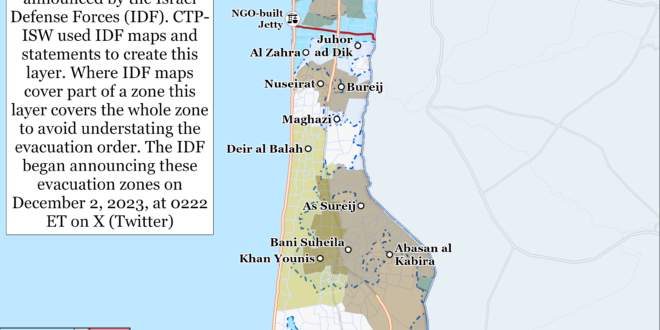Iranian President-elect Masoud Pezeshkian is articulating a foreign policy that is a continuation of the policies of his hardline predecessor even as Pezeshkian attempts to present himself to the West as a “reformist.” Pezeshkian penned an op-ed entitled “My Message to the World” in English-language, Foreign Ministry-affiliated outlet the Tehran Times on July 12.[i] Pezeshkian framed himself as a reformist and reiterated that he ran his presidential campaign “on a platform of reform.” Pezeshkian contradicted his initial statement by reaffirming his commitment to many of the policies of his hardline predecessor, most notably signaling support for continuing former President Ebrahim Raisi’s “neighborhood” policy. The “neighborhood” policy seeks to build relations with regional states.[ii] The policy is part of a broader Iranian effort to build a new regional order in which Iran is a central player and the United States has little influence.[iii] Pezeshkian emphasized the importance of cooperation with regional partners including Iraq, Oman, Bahrain and Turkey. Pezeshkian also emphasized the importance of working with neighboring Arab countries in an op-ed in UK-based, Qatari-owned Arabic-language outlet al Araby al Jadeed on July 10. Pezeshkian added that one of his administration’s first measures will be to work with neighboring Arab countries to ”utilize all political and diplomatic leverages” to secure a ceasefire and prevent the widening of the Israel-Hamas war. Pezeshkian stressed the ”de[v]value” of Iran’s relations with Russia and China. Pezeshkian separately reaffirmed his commitment to the Axis of Resistance through letters and phone calls following the election.[vi]
Pezeshkian’s only articulated policy that aligned with his “reformist” agenda is his desire to pursue a nuclear deal with the West. Pezeshkian restated his intention to engage in “constructive dialogue” with Western countries in his op-ed. Pezeshkian repeatedly emphasized his desire to pursue nuclear negotiations with the West throughout his campaign.[vii] It is unclear whether Supreme Leader Ali Khamenei would permit Pezeshkian to pursue nuclear negotiations with the West in a manner that is meaningfully different from the Ebrahim Raisi administration. The Raisi administration attempted to pursue nuclear negotiations with the West, albeit Raisi sought to gain broad sanctions relief in exchange for small concessions on the Iranian nuclear program.[viii] Khamenei implicitly criticized Pezeshkian’s support for increasing Iranian engagement with the West in a speech on June 25.[ix]
The Israel Defense Forces (IDF) has not officially confirmed whether it killed Hamas’ top military commander, Mohammad Deif. The IDF did not include Deif on the list it published on July 16 that shows Hamas commanders who the IDF has confirmed it killed in the Gaza Strip.[x] Israeli journalists reported that the IDF assesses that the likelihood Deif survived the July 13 strike is “extremely slim,” however.[xi] The IDF reportedly has increased confidence that Deif was inside the compound of Hamas Khan Younis Brigade Commander Rafe Salamah. The IDF has already confirmed that it killed Salamah in the strike.[xii] The IDF Air Force dropped eight 2,000-pound precision munitions targeting a building that the IDF believed Deif and Salamah had entered.[xiii] The IDF also believes that recent clearing operations forced Deif to leave the underground tunnels where he was hiding to join Salamah in the al Mawasi humanitarian zone.[xiv] Israeli intelligence and security establishments reportedly assess that Deif’s death would increase the likelihood of reaching a ceasefire agreement “due to Deif’s fanatical positions.”[xv][xvi]
Key Takeaways:
- Iran: Iranian President-elect Masoud Pezeshkian is articulating a foreign policy that is a continuation of the policies of his hardline predecessor even as Pezeshkian attempts to present himself to the West as a “reformist.”
- Gaza Strip: The Israel Defense Forces (IDF) has not officially confirmed whether it killed Hamas’ top military commander, Mohammad Deif. Israeli journalists reported that the IDF assesses that the likelihood Deif survived the July 13 strike is “extremely slim,” however.
- Israel: Israeli police and Shin Bet arrested three Israeli citizens accused of working for Iranian intelligence.
- Yemen: The Houthis claimed three attacks on July 16 targeting civilian tankers in the Red Sea and Mediterranean Sea on July 15.
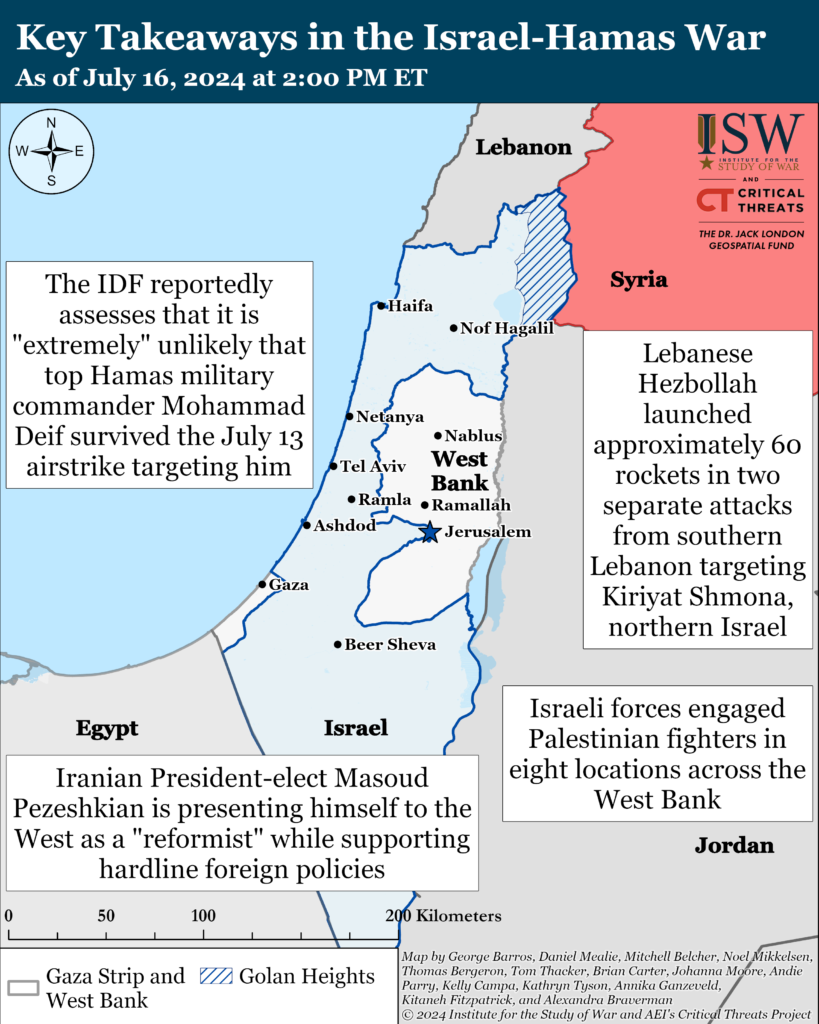
Gaza Strip
Axis of Resistance objectives:
Erode the will of the Israeli political establishment and public to sustain clearing operations in the Gaza Strip
Reestablish Hamas as the governing authority in the Gaza Strip
The IDF 3rd (Alexandroni) Brigade raided Palestinian militia sites along the Netzarim Corridor on July 16.[xvii] The al Aqsa Martyrs’ Brigades fired rockets and mortars at Israeli forces along the corridor.[xviii] Palestinian Islamic Jihad (PIJ) separately conducted a sniper attack targeting Israeli infantry along the corridor.[xix]
The IDF 162nd Division continued clearing operations in Rafah on July 16.[xx] Israeli soldiers killed several Palestinian fighters, located tunnel shafts and destroyed unspecified militia infrastructure in Rafah.[xxi] The al Aqsa Martyrs’ Brigades mortared Israeli armor in eastern Rafah.[xxii]
The IDF Air Force struck Palestinian fighters operating in a United Nations Relief and Works Agency (UNRWA) school in Nuseirat on July 16.[xxiii] The IDF said that the fighters used the school to plan and carry out attacks targeting the IDF in the Gaza Strip. Hamas condemned the strike and claimed that the strike targeted displaced Palestinians.[xxiv] An Israeli military correspondent reported that the IDF has recognized a pattern over the past several months of Hamas moving command centers and makeshift weapons manufacturing from underground sites to humanitarian shelters such as schools.[xxv]
An IDF Air Force airstrike killed a PIJ Naval Force commander in western Khan Younis on July 16.[xxvi] Palestinian sources reported that the strike killed at least 17 Palestinian civilians.[xxvii] The IDF said that it is investigating whether the strike killed civilians.[xxviii] Western Khan Younis is within the expanded al Mawasi humanitarian zone.
The IDF Air Force stated on July 16 that it struck over 40 targets across the Gaza Strip in the past day, including sniper and observation posts, military buildings, militia sites and rigged-to-explode buildings.[xxix]
Hamas leader in the Gaza Strip Yahya Sinwar is under mounting pressure from his subordinates to agree to a ceasefire deal, according to US intelligence officials. Central Intelligence Agency Director Bill Burns told a private conference on July 13 that Sinwar is not “concerned with his [own] mortality” but that he is being pressured by the humanitarian catastrophe in the Gaza Strip.[xxx] The Associated Press (AP) reported on July 8 that several senior Hamas officials advocated for accepting a ceasefire agreement proposed by the United States, citing internal communications seen by AP.[xxxi] AP stated that several unspecified Hamas officials in Gaza signed a statement urging exiled Hamas political leaders in Qatar to accept the ceasefire proposed by US President Joe Biden, citing heavy casualties and “dire” conditions sustained throughout the war.[xxxii] The statement seen by AP was reportedly from April or May 2024.[xxxiii] Sinwar has reportedly come under more intense pressure from senior Hamas commanders over the past two weeks.[xxxiv]
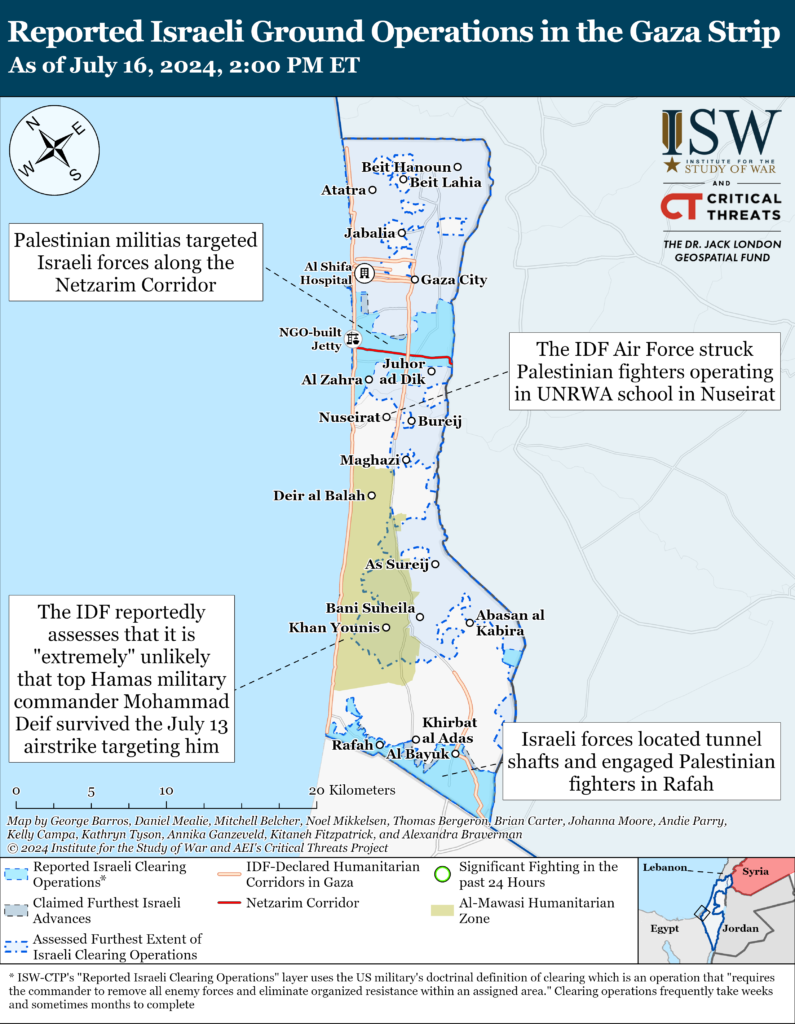
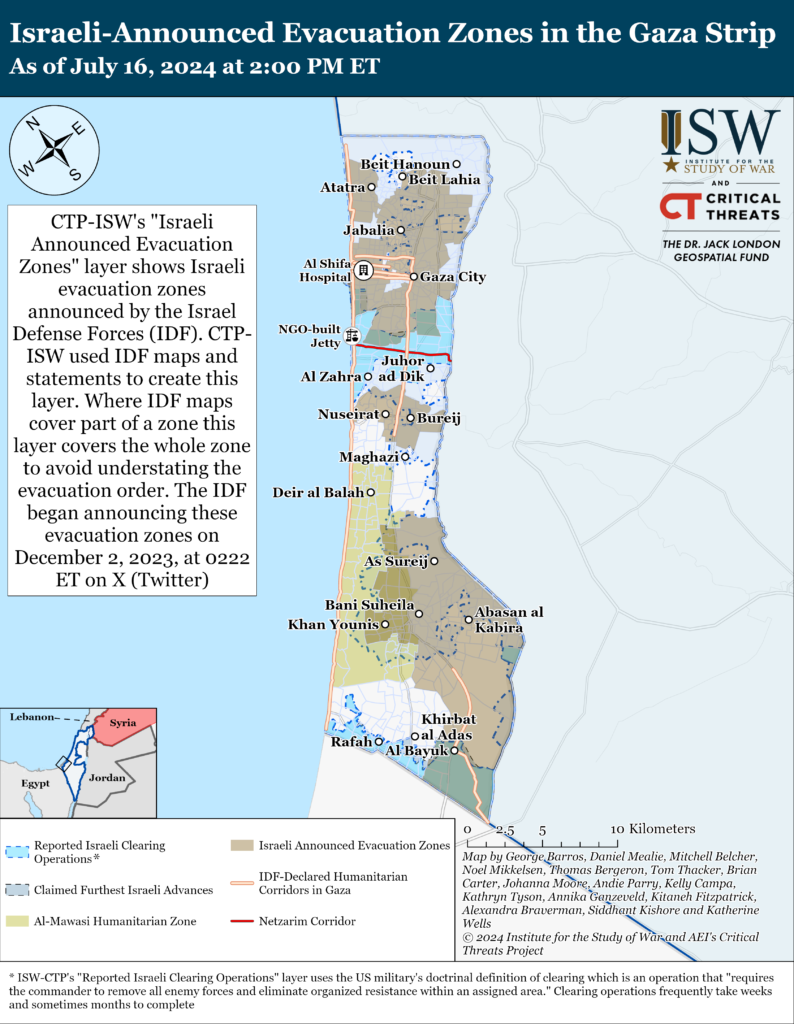
PIJ fired at least three rockets targeting Sderot, southern Israel, from the Gaza Strip on July 16.[xxxv] An Israeli Army Radio correspondent reported that the Israeli air defense intercepted one rocket and allowed the other two to strike open areas.[xxxvi]
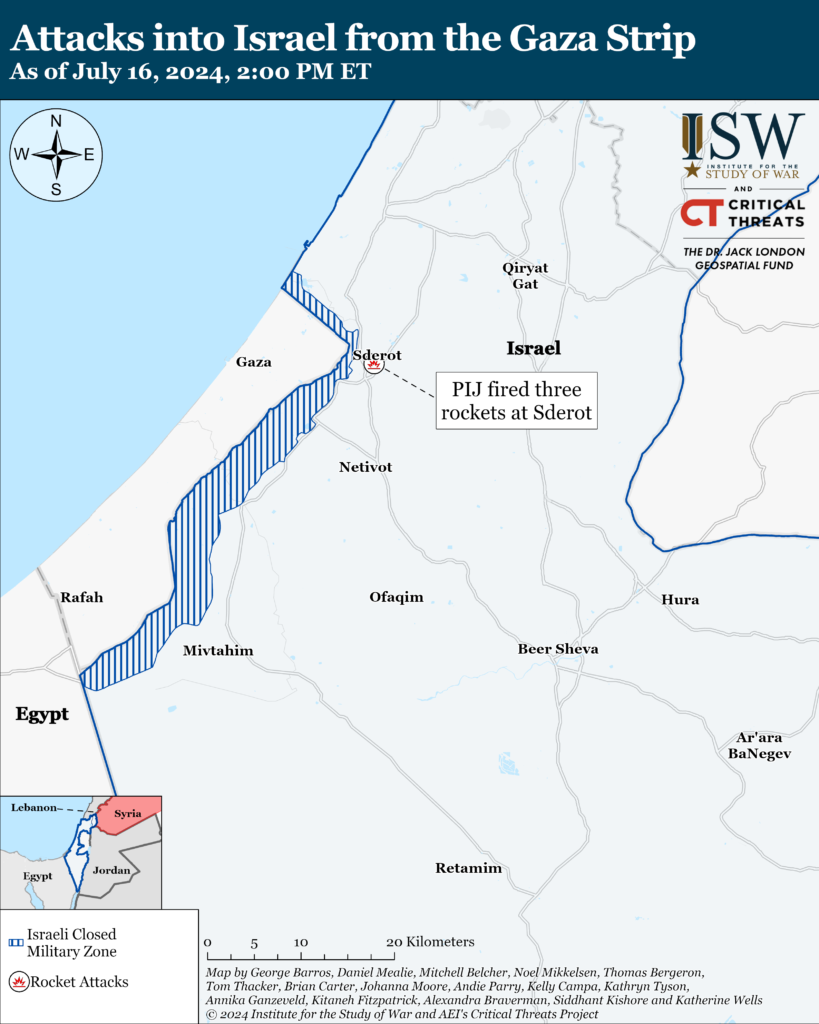
Recorded reports of attacks; CTP-ISW cannot independently verify impact.
West Bank
Axis of Resistance objectives:
Establish the West Bank as a viable front against Israel
Israeli forces have engaged Palestinian fighters in at least eight locations in the West Bank since CTP-ISW’s data cut off on July 15.[xxxvii] The al Aqsa Martyrs’ Brigades and Palestinian Islamic Jihad fired small arms and detonated IEDs targeting Israeli forces in multiple locations in Tubas city, West Bank.[xxxviii] The al Aqsa Martyrs’ Brigades also fired small arms and detonated IEDs targeting Israeli forces in Nablus and Qalqilya.[xxxix] Israeli forces detained eight wanted persons in the West Bank on July 16.[xl] Israeli Border Police killed a Palestinian fighter who stabbed an Israeli soldier in al Bireh on July 16.[xli] The IDF separately shot an unidentified gunman and detained a wanted person in Nablus.[xlii]
Unidentified Palestinian fighters fired small arms targeting an Israeli vehicle that injured “several” civilians in Ramin junction, West Bank, on July 16.[xliii] Israeli forces launched a search in the surrounding area for the suspects.[xliv]
Israeli police and Shin Bet arrested three Israeli citizens accused of working for Iranian intelligence.[xlv] An Israeli military correspondent reported that 21-year-old Elimelech Stern from Beit Shemesh delivered money and threatening messages or packages to various locations in Jerusalem and Tel Aviv. Stern recruited two other Israeli citizens to support his operations. All three individuals received payments in cryptocurrency.
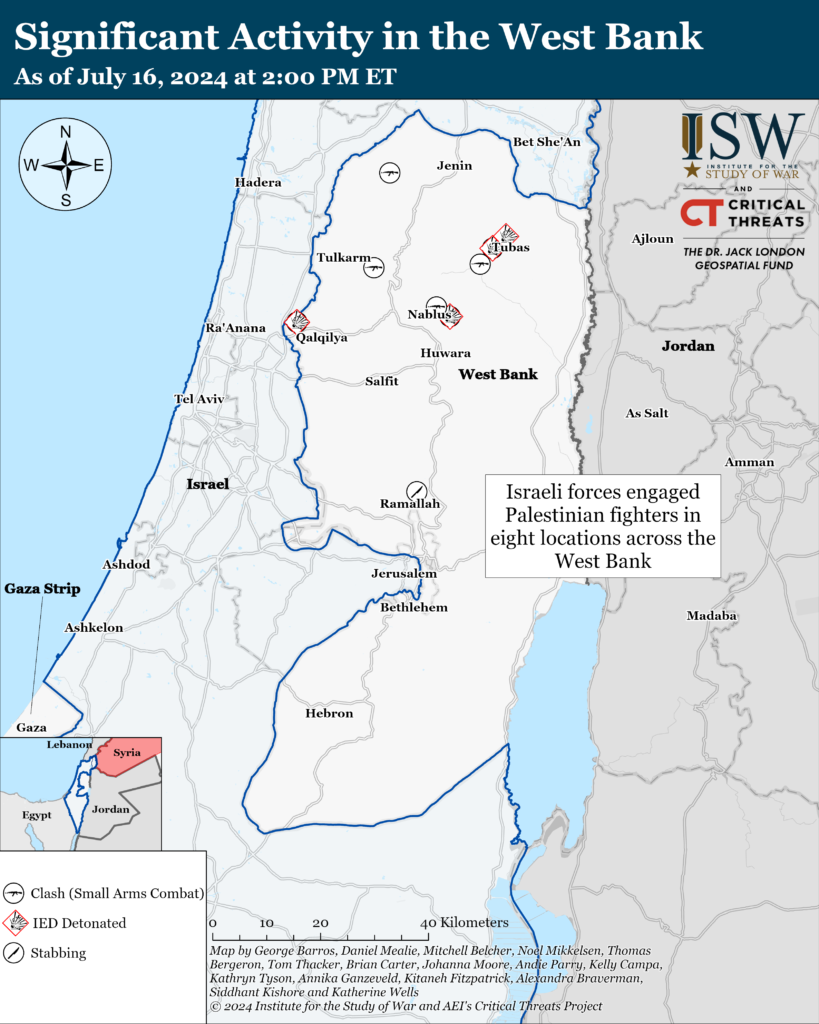
This map is not an exhaustive depiction of clashes and demonstrations in the West Bank.
Southern Lebanon and Golan Heights
Axis of Resistance objectives:
Deter Israel from conducting a ground operation into Lebanon
Prepare for an expanded and protracted conflict with Israel in the near term
Expel the United States from Syria
Lebanese Hezbollah launched approximately 60 rockets in two separate attacks from southern Lebanon targeting Kiriyat Shmona, northern Israel, since CTP-ISW’s last data cut off on July 15.[xlvi] The IDF detected approximately 20 launches from Lebanese territory on July 15 and intercepted ”most” of them.[xlvii] The IDF detected approximately 40 rockets launched from southern Lebanon on July 16 and intercepted “some” of the 40 rockets.[xlviii] The IDF sometimes elects not to shoot down rockets if the rockets are on a trajectory that will hit a field or other uninhabited areas. The IDF reported that neither attack resulted in casualties. Hezbollah claimed that the strikes were in retaliation for Israeli strikes targeting Hezbollah fighters and infrastructure in Bint Jbeil and Kfar Tebnit on July 15.[xlix]
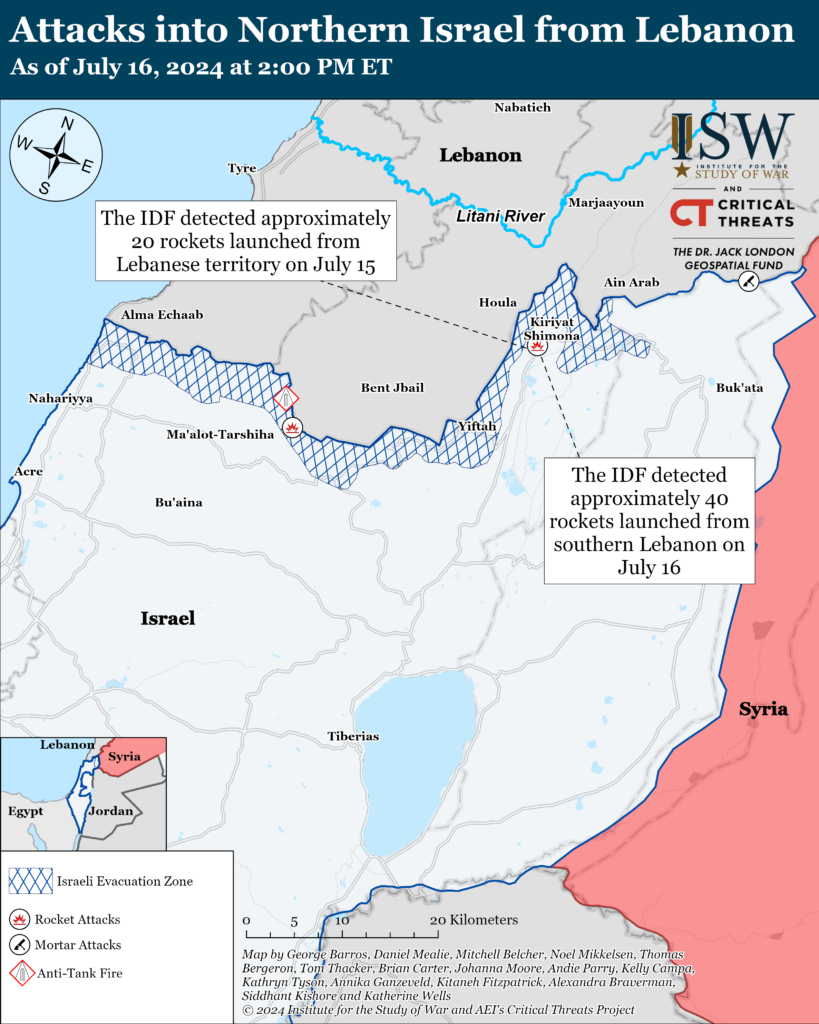
Recorded reports of attacks; CTP-ISW cannot independently verify impact.
Iran and Axis of Resistance
Iranian Supreme Leader Ali Khamenei and President-elect Masoud Pezeshkian attended a religious service at in Tehran for Iman Hussein’s Memorial Day, known as Ashura 15. Pezeshkian stated in a speech that Iran can solve its problems by ”following the order of the i[l]faction. Pezeshkian also participated in a memorial at Tharullah Hosseinieh[li] The Supreme Leader‘s senior international affairs adviser and Expediency Discernment Council member Ali Akbar Velayati separely presented Pezeshkian with religious flag during a separate Ashura ceremony on July 26.[lii]
Interim Iranian Foreign Affairs Minister Ali Bagheri Kani claimed that Israel is losing the war against a coalition of Iran’s allies in an interview with Newsweek on the sidelines of the United Nations meeting in New York on July 16.[liii] This is Bagheri Kani’s first interview with a foreign news outlet. Bagheri Kani stated that Iran remains open to resuming negotiations with the United States, but Iran also intends to deepen ties with China, Russia, and neighboring countries. Bagheri Kani emphasized that it is time for other countries to positively react to the ”constructive developments” of Pezeshkian’s election in Iran. Bagheri Kani participated in the United Nations Security Council (UNSC) meeting on multilateralism on July 16 and will participate in the UN meeting on Palestine on July 17. Bagheri Kani blamed the United States for the failure of the nuclear deal, and he called on the UNSC to implement a ceasefire for the Israel-Hamas war.[liv]
Iranian Foreign Ministry Spokesperson Nasser Kanani called on the United States to take the initiative in reviving the Joint Comprehensive Plan of Action (JCPOA) during an interview that aired on July 16 with Kremlin-run broadcaster Russia Today.[lv] Kanani claimed that Iran is ready to develop constructive relations with all countries who are willing to start from a position of ”mutual respect.” Kanani acknowledged that the president answers to the and takes guidance from the supreme leader under the Iranian constitution, but that President-elect Masoud Pezeshkian may adopt new “methods, plans, and tactics” in its daily operations. Kanani posited that Russia-Iran relations are ”historically the best” due to cooperation in economic, geopolitical, and counterterrorism fields. Kanani also named Russia as an Iranian partner in establishing “peace and stability” in the Middle East.
The Houthis claimed three attacks on July 16 targeting civilian tankers in the Red Sea and Mediterranean Sea on July 15.[lvi] The Houthis launched a naval attack drone targeting the Marshall Islands-owned, Liberia-flagged MT Chios Lion crude oil tanker in the Red Sea.[lvii] US CENTCOM said that the attack caused minor damage to the tanker.[lviii] The Houthis launched naval attack drones, one-way aerial attack drones, and ballistic missiles targeting the Israeli-owned, Panama-flagged tanker MT Bentley I in the Red Sea.[lix] The tanker was carrying vegetable oil from Russia to China.[lx] The United Kingdom Maritime Trade Operations reported two attacks on vessels in the Red Sea on July 15, and US CENTCOM confirmed both attacks on July 15.[lxi] CTP previously reported these two attacks. The Houthis also claimed a joint attack with the Islamic Resistance in Iraq (IRI) targeting the Cyprus-flagged tanker Olvia[lxii][lxiii] The ship’s owner Island Oil denied that the attack occurred[lxiv][lxv] The Houthis and IRI have claimed conducting 12 joint attacks targeting Israeli territory and ships in the Mediterra[lxvi][lxvii]
Houthi supreme leader Abdulmalik al Houthi gave a speech on July 16 warning Saudi Arabia against unspecified cooperation with the United States.[lxviii] Abdulmalik said that the Houthis would respond to Saudi “aggression” against Yemen. Abdulmalik condemned Saudi ”economic aggression” against Houthi-controlled areas in Yemen on July 11 and threatened to strike sensitive Saudi infrastructure on July 8. The Houthis published aerial photographs of major Saudi airports and maritime ports as part of these threats.[lxix]
US CENTCOM intercepted five Houthi drones in the Red Sea and Yemen on July 15.[lxx] CENTCOM intercepted three Houthi drones in the Red Sea and two Houthi drones in Yemen.
 Eurasia Press & News
Eurasia Press & News
